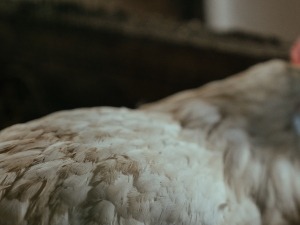
A variety of illnesses can affect your chickens, some illnesses are more serious than others and some can kill your chicken if not addressed.
If your chicken is puffed up and has its tail down you’d be right to worry, this article looks into why this happens.
Table of Contents
Chicken puffed up tail down:
A change in your bird’s behavior and appearance may mean that your bird is sick, or, it may mean that there is a change in your bird, here are reasons why your bird may be puffed up and have its tail down:
Egg binding:
The egg-laying process doesn’t always go so smoothly for chickens, things can go wrong at any stage. If your chicken has its tail down and is puffed up, then the bird may be egg-bound.
An egg bound chicken is a chicken whose eggs are stuck in the oviduct.
The oviduct is the tube where an egg is formed inside of the chicken’s body. The end of the oviduct, called the vent, is where the egg exits the bird’s body when it has fully formed.
If an egg fully forms, but does not exit the chicken, then the bird will be egg-bound. This is a common occurrence in younger layers but chickens of any age can become egg-bound.
Other symptoms of egg binding in chickens, apart from the bird being puffed up and having its tail down, include straining to get an egg out, a pale comb, a loss of appetite, waddling, loose stools, penguin walk, tail pumping, and lethargy.
What to do:
You’d need to first feel the bird’s insides to see if the bird is in fact egg bound. Before inserting your fingers, wear a pair of latex gloves and slather some KY jelly onto your fingers.
Once your fingers are adequately lubricated, insert your fingers into the bird’s vent. If your fingers reach 2 inches into the bird and you feel nothing, then the bird is not egg-bound.
If the bird is egg-bound, then you’ll feel the egg without having to go in too deep.
If you realize that your bird is indeed egg-bound, then you can offer your bird more calcium, calcium will help the bird create stronger contractions and this will help it expel the egg.
Your chicken will likely not take whole calcium tablets so you may need to crush the tablet up and place it in her food to get her to eat it.
Soak the bird after you’ve given her the calcium tablet.
Create a bath for your bird using warm water and Epsom salts. Do not create too deep of a bath, the bath should only be deep enough to where the water reaches three or four inches in height when the bird sits in the bath.
Leave the bird in the bath for about 15 to 20 minutes and then dry her off. Once she is dry, encourage her to lay the egg by placing her in a dark quiet, and secluded room
Lubricating the vent area will help the egg slide out easier. Lubricate the bird’s vent by applying some KY jelly to the vent.
You may need to soak her, and leave her in the dark room, three or four times before she expels the egg. If this doesn’t work then you’d need to take the bird to the vet
Egg yolk peritonitis:
This is another egg-related condition that can develop in your bird. Egg yolk peritonitis, also called yolk stroke or abdominal sepsis, happens when the yolk does not move into the bird’s oviduct as it should, the yolk rather moves into the bird’s abdomen.
The first step of egg development in chickens happens when the bird’s ovaries release a yolk into the oviduct. The oviduct is where the yolk will form into an egg.
If the yolk misses the oviduct, then the yolk will land in the bird’s abdomen and cause an infection called egg yolk peritonitis.
Symptoms of this ailment include lethargy, a droopy tail, a swollen abdomen, depression, weight loss, yolk-like droppings, and weakness.
What to do:
You need to take the bird to the vet to be examined and diagnosed. If it is found that your bird does have this ailment then your vet will prescribe a course of antibiotics for your bird. Antibiotics will fight off the infection in the bird’s abdomen.
The vet will also syringe out the yolk if the yolk has not solidified into a solid mass.
If the egg yolk in the bird’s abdomen solidifies in the chicken, and turns into a mass, then it will take up precious space where important organs would otherwise go. At this stage, the bird will need surgery to get the mass out
If you enjoyed this article then you may also be interested in other chicken related articles. Here are some articles that you may be interested in: Baby Chick Making Green Poop, Black Tar Chicken Poop, Chicken Has A Floppy Comb + Is Lethargic, Baby Chick Suddenly Can’t Walk, What Does Black Chicken Poop Mean?

